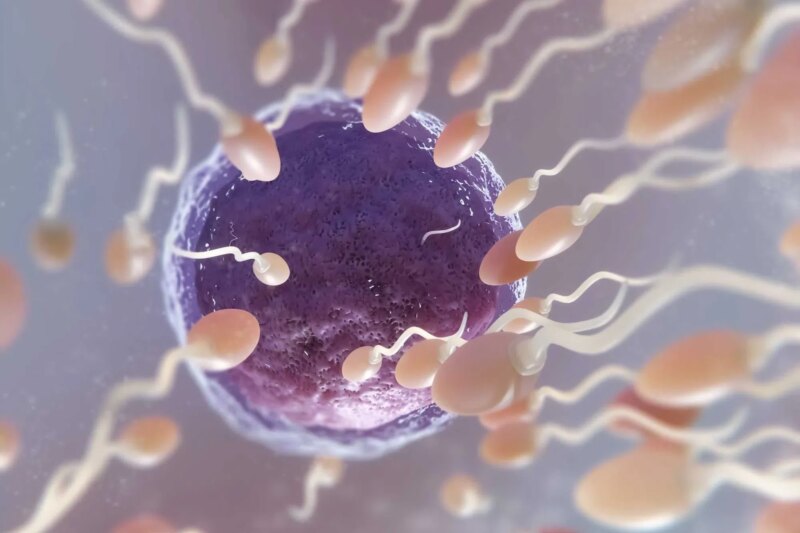
In many societies, infertility is often seen as a woman’s issue, but medical experts warn that men contribute to nearly half of all infertility cases among couples.
Infertility refers to the inability of a couple, within the reproductive age range, to achieve a spontaneous pregnancy after 12 months of regular, sufficient, unprotected sexual intercourse. Sufficient, in this case, means having at least three regular, unprotected sexual encounters per week.
ALSO READ: Men Can Get Breast Cancer Too: A Doctor Explains What You Should Know
What Causes Male Infertility?
Male infertility happens when a man’s body is unable to produce healthy sperm, deliver them properly, or when something interferes with the hormones that control reproduction.
According to Dr. Oluwadunsin Oluwaseyitan Adesopo, Medical Doctor /Sexual health advocate/Family planning coach, infertility can be primary (when a man has never fathered a child) or secondary (when he has fathered one before but can’t anymore), hence the causes of both often fall into four main groups:
1. Hormonal Problems (Endocrine Causes)
This occurs when the body doesn’t produce enough of the hormones needed for sperm production, and it could be diagnosed as:
-
Kallmann’s syndrome – This delays or stops puberty completely.
-
High levels of a hormone called prolactin – This lowers testosterone and reduces sperm count.
-
Thyroid disorders – This can upset the hormone balance needed for fertility.
RELATED: Top 10 herbs to boost male fertility
2. Structural or Anatomical Issues
Sometimes, the tubes that carry sperm (called the vas deferens) are missing from birth or blocked, preventing sperm from being released during ejaculation.
3. Sperm Production
Infections, injuries, or medical conditions can damage the testicles and affect sperm quality or quantity in the following ways:
-
Mumps orchitis (a complication of mumps after puberty) can inflame the testicles.
-
Undescended testicles (cryptorchidism) mean the testes never moved into the scrotum, which can cause infertility later in life.
-
Exposure to chemicals, radiation, or certain drugs can harm sperm cells.
4. Sexual or Functional Issues
These include conditions like low libido, erectile dysfunction, or retrograde ejaculation (when semen flows backwards into the bladder instead of out), which can affect sexual performance and make conception difficult.
5. Lifestyle And Environmental Factors
Everyday habits and surroundings also play a big role:
-
Long hours of driving or sitting can increase heat around the testicles.
-
Wearing very tight underwear or trousers can affect sperm production.
-
Smoking, drinking alcohol, or using recreational drugs can lower fertility.
-
Some prescription medications (like certain antipsychotics or blood pressure drugs) may reduce sexual drive or sperm quality.
YOU MIGHT LIKE: 5 male fertility myths you should stop believing
5 Warning Signs of Male Infertility
Dr. Adesopo identifies several red flags that could signal fertility problems, and they are:
-
Reduced sex drive – A noticeable decline in sexual desire can point to hormonal imbalances.
-
Erection difficulties – Struggling to achieve or maintain an erection may affect conception chances.
-
Ejaculation issues – Premature, delayed, or absent ejaculation can all be signs of underlying infertility.
-
Pain or swelling in the testicles – This could indicate infection, injury, or other testicular problems.
-
Changes in appearance or body hair – Conditions like gynecomastia (enlarged breast tissue) or decreased facial/body hair may hint at hormonal causes.
Other subtle signs include fatigue, weight changes, and discoloured semen, which might suggest infection.
RECOMMENDED: 5 symptoms and causes of infertility in men
When to See a Doctor
You should seek medical evaluation if you have been trying to conceive for 12 months without success or experience any of the symptoms listed above. Dr Adesopo notes that tests like semen analysis, testicular biopsy, or ultrasound can help determine the cause. She adds that delayed medical visits are common:
Unfortunately, many people think that infertility is solely a woman’s issue. The reality is that it also affects men. This is often recognised late due to their delayed visits to healthcare facilities and a lack of awareness about male infertility.
Treatment and Lifestyle Changes
Male infertility can often be managed or reversed depending on the cause. Dr. Adesopo advises men to:
-
Avoid known risk factors such as smoking, alcohol, and tight underwear.
-
Treat underlying infections or hormonal issues.
-
Consider surgery to correct structural problems.
-
Take medications for sexual dysfunction if prescribed.
-
Work alongside their partners rather than in isolation.
Perhaps the biggest barrier to male infertility is silence. Many men shy away from talking about fertility concerns out of shame or misinformation. Dr. Adesopo stresses:
A prominent misconception is the belief that infertility does not affect men. This is false. Infertility can indeed happen to men.
RECENT: Inside this village where women are forbidden to give birth – It is a taboo!








